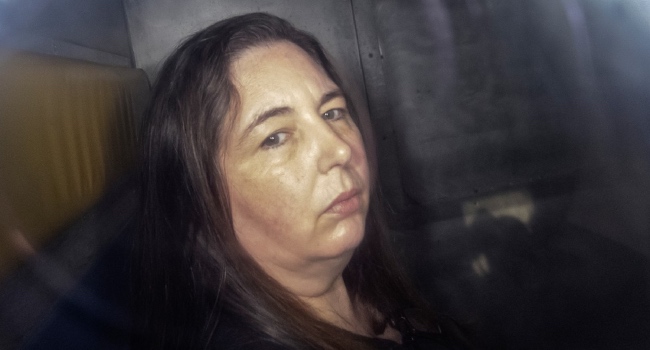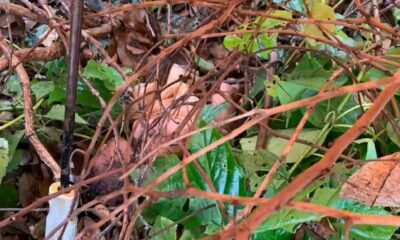FOREIGN
Australian Woman Guilty of Murdering In-Laws with Toxic Mushroom Beef Wellington

An Australian woman has been found guilty of murdering her in-laws by poisoning them with a beef Wellington laced with deadly mushrooms, in a case that has shocked the nation and gripped global audiences.
Erin Patterson, a 50-year-old home cook from the rural town of Morwell in Victoria, was convicted on Monday of murdering three of her husband’s relatives and attempting to murder a fourth during a family lunch at her home in July 2023.
“She didn’t do it deliberately. She didn’t do it intentionally,” her defence lawyer, Colin Mandy, insisted throughout the high-profile trial. But a jury of 12 was not convinced. After two months of courtroom proceedings and a week of deliberations, they returned a verdict of guilty on all charges, including triple murder and one count of attempted murder.
According to prosecutors, Patterson prepared an elegant meal of beef Wellington, wrapping prime cuts of meat in mushroom paste and pastry. Among her guests were her estranged husband’s parents, Don and Gail Patterson, and his aunt and uncle, Heather and Ian Wilkinson.
Tragically, Don, Gail, and Heather died of organ failure within a week of eating the meal. Ian, a local Baptist pastor, survived but spent weeks in the hospital recovering.
Detective Inspector Dean Thomas, speaking after the verdict, urged the public not to lose sight of the human loss behind the headlines. “I think it’s very important that we remember that we’ve had three people that have died,” he said. “I ask that we acknowledge those people and not forget them.”
The case quickly drew global attention, with reporters and true-crime followers descending on the quiet community. Newspapers around the world dubbed the incident the “mushroom murders.”
During the trial, the prosecution argued that Patterson knowingly used Amanita phalloides—commonly known as death cap mushrooms—which are responsible for 90% of all fatal mushroom poisonings. They alleged she lied to lure the victims to lunch, falsely telling them she had been diagnosed with cancer and needed advice on how to tell her children.
“She lied because she was afraid she would be held responsible,” Patterson admitted during testimony. She also initially denied owning a food dehydrator, which investigators later found dumped in a landfill and contaminated with traces of the lethal fungus.
Adding to the suspicion, investigators said they discovered internet searches on Patterson’s computer for mushroom foraging sites close to her home—locations where death cap mushrooms were known to grow.
Despite insisting through her lawyers that the poisoning was “a terrible accident,” Patterson’s odd behaviour further raised eyebrows. According to surviving guest Ian Wilkinson, all the visitors were served from grey plates, while Patterson ate from a separate orange dish.
Even friends painted a curious picture. Christine Hunt described Patterson as “a bit of a super sleuth” who had a keen interest in true crime and often discussed notorious Australian murder cases online.
Now facing life imprisonment, Patterson is expected to appear for sentencing in the coming weeks. Her legal team has 28 days after sentencing to file an appeal, though they have yet to confirm whether they will.
As the town of Morwell returns to quiet, the legacy of this strange and tragic crime is sure to linger for years.
Discover more from Asiwaju Media
Subscribe to get the latest posts sent to your email.
-

 POLITICS11 hours ago
POLITICS11 hours agoChinedu Ogah Decamps from APC to ADC, Joins Coalition—Video Claims Surface Online
-

 NEWS3 days ago
NEWS3 days agoNigerian Internet Fraudster Ehiremen Aigbokhan Accused of Stealing ₦460 Million Meant for Trump Inauguration
-

 ENTERTAINMENT5 days ago
ENTERTAINMENT5 days agoShocking! Davido Accused of Secret Dealings That Could Ruin His Career
-

 NEWS5 days ago
NEWS5 days agoPlateau Assembly Elects Nanloong Daniel as Speaker After Dewan’s Resignation
-

 POLITICS3 days ago
POLITICS3 days agoAmaechi Wife Stole N4B Every Month, Says Wike
-

 NEWS2 days ago
NEWS2 days agoEbonyi Village Lights Up with Self-Funded Electrification , Plans Road Construction
-

 JOBS/SCHOLARSHIPS6 days ago
JOBS/SCHOLARSHIPS6 days agoCall For Applications: SEEDINVEST Acceleration Program For Nigerian Entrepreneurs (Up to N5 Million in Asset Grants + 6-week online Training)
-

 POLITICS3 days ago
POLITICS3 days agoADC Targets Five Governors as More PDP, APC Leaders Join Opposition Coalition
-

 CAMPUS REPORTS4 days ago
CAMPUS REPORTS4 days agoAbandoned Newborn Sparks Outrage in Ikwo Community Near FUNAI Campus
-

 POLITICS2 days ago
POLITICS2 days agoADC Ebonyi Welcomes Massive Influx of New Members
-

 POLITICS6 days ago
POLITICS6 days agoNwifuru condemns killing of 13 Ebonyi indigenes in Anambra, vows justice
-

 INSIDE NYSC6 days ago
INSIDE NYSC6 days agoSanwo-Olu Urges 7,887 Corps Members to Tackle Unemployment with Enterprise




























